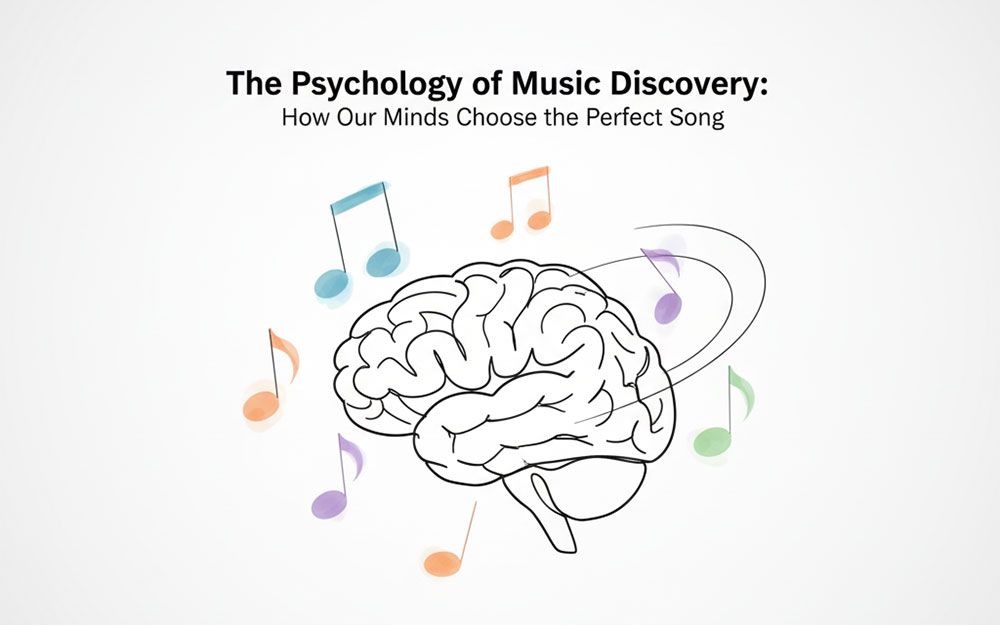Every day, millions of people make countless micro-decisions about what music to play. Whether you're reaching for your phone to skip a track or letting a song play on repeat for the hundredth time, your brain is engaged in a complex psychological process that determines your musical preferences. Understanding the psychology behind music discovery not only illuminates the mysterious ways our minds work but also reveals how modern streaming platforms like spring-music.com can better serve our deepest musical needs. This exploration into the cognitive science of music selection will transform how you think about your own listening habits and the future of personalized audio experiences.
The Emotional Brain: Why We Connect with Certain Sounds
Music is fundamentally an emotional language, and our brains are wired to respond to it in profound ways. Neuroscience research shows that when we hear music, multiple brain regions activate simultaneously: the auditory cortex processes the sound, the limbic system generates emotional responses, and the motor cortex responds to rhythm. This neurological symphony explains why certain songs can instantly transport us to specific memories or change our mood within seconds. The dopamine reward system plays a crucial role in music discovery—when we encounter a song that resonates, our brain releases the same chemicals associated with other pleasurable experiences. This biological response creates musical preferences and drives us to seek out similar auditory experiences. Understanding this process helps explain why algorithmic recommendations work and why human curation remains irreplaceable in music discovery.
Cognitive Patterns in Musical Choice
Our music discovery patterns are far from random; they follow predictable cognitive frameworks that psychologists have identified and studied. The mere exposure effect suggests that we tend to prefer music we've heard before, which explains why radio hits become popular and why nostalgia plays such a strong role in our playlists. However, we also crave novelty—a psychological principle called optimal arousal theory suggests that we seek the right balance between familiarity and surprise. Too familiar, and music becomes boring; too novel, and it becomes overwhelming. Successful music discovery happens in the sweet spot between these extremes. Additionally, our musical choices are heavily influenced by social proof—we're more likely to enjoy music that our peers recommend or that has high social validation. This explains the viral nature of music trends and the importance of social features in modern streaming platforms.
The Role of Context in Music Selection
Context is king when it comes to music psychology. The same person might prefer classical music while working, electronic beats while exercising, and acoustic folk while relaxing. This context-dependent preference is rooted in our brain's ability to associate musical characteristics with appropriate situational needs. Tempo, for example, naturally synchronizes with our desired energy levels and activities. Major keys tend to feel uplifting and are preferred during positive social situations, while minor keys can feel more introspective and suit contemplative moments. Environmental factors also play a crucial role: we might choose different music for private listening versus shared spaces, for focus versus socializing, for morning versus evening hours. Advanced music platforms now leverage these contextual patterns, using data about time, location, activity, and even weather to suggest appropriate musical choices.
Cultural and Personal Identity Through Music
Music serves as a powerful tool for identity expression and cultural connection. Our musical preferences become part of our personal brand, signaling our values, personality traits, and group affiliations to others. This psychological function of music explains why people can be so passionate about their favorite artists and defensive about their musical tastes. Research shows that musical preferences are established primarily during adolescence and early adulthood, when identity formation is at its peak. However, these preferences continue to evolve throughout life, influenced by significant experiences, relationships, and life transitions. Cross-cultural studies reveal both universal musical preferences (such as preference for consonance over dissonance) and culture-specific patterns that reflect local musical traditions and social values. Understanding these identity aspects of music helps explain why personalization algorithms must consider not just what you listen to, but who you are and who you aspire to be.
The Future of Psychologically-Informed Music Discovery
As our understanding of music psychology deepens, the future of music discovery becomes increasingly sophisticated and personalized. Emerging technologies are beginning to incorporate biometric data, emotional state recognition, and even brain activity patterns to predict optimal musical choices. Machine learning models are evolving beyond simple collaborative filtering to understand the psychological principles underlying musical preference. This includes recognizing patterns in mood progression, predicting contextual needs, and understanding the complex interplay between novelty and familiarity that drives musical satisfaction. However, the human element remains crucial—no algorithm can fully replicate the intuitive understanding that comes from shared human experience and cultural knowledge. The future lies in hybrid systems that combine psychological insights, technological capabilities, and human curation to create truly intelligent music discovery experiences.
Understanding the psychology of music discovery empowers both listeners and creators to make more informed choices about musical experiences. As platforms like spring-music.com continue to evolve, they're not just organizing sound—they're orchestrating the complex psychological processes that make music one of humanity's most powerful and universal languages. The next time you find yourself drawn to a particular song, remember that you're participating in an intricate dance between technology, psychology, and the fundamental human need for emotional expression through sound.
